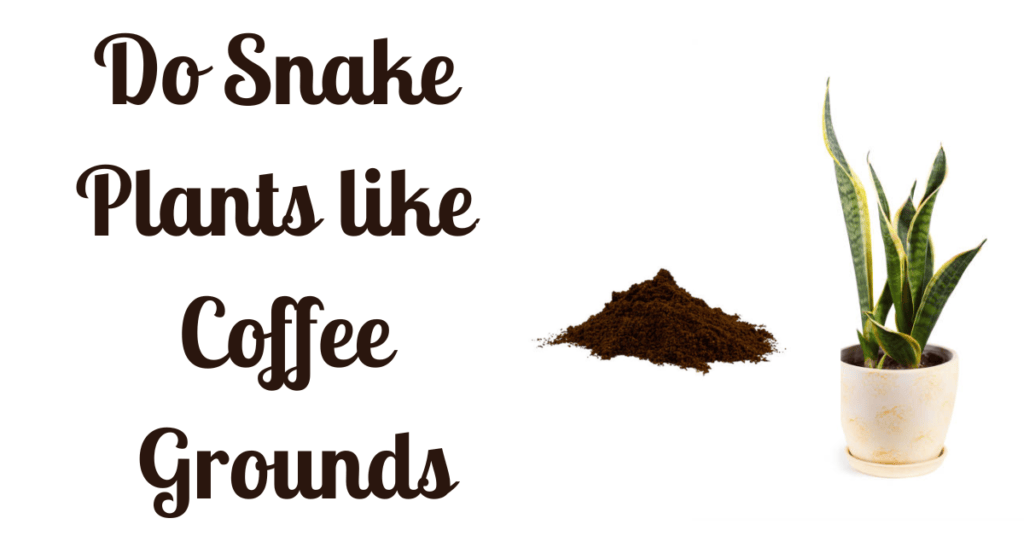Snake plants are renowned for their ability to thrive in low-light conditions and their resilience, making them popular among indoor plant enthusiasts.
One question that often arises is, do snake plants like coffee grounds?
Coffee grounds have gained popularity as a natural and readily available soil amendment, praised for their ability to enrich the soil with organic matter and nutrients.
However, snake plants have specific preferences when it comes to their care.
While coffee grounds can benefit some plants due to their acidity and nutrient content, snake plants typically thrive in well-draining, sandy soil.
Adding coffee grounds to the soil may alter the pH and moisture retention properties, potentially leading to unfavorable conditions for snake plants.
In this blog, we will understand whether coffee is good for snake plants, whether you can feed snake plants coffee grounds, the benefits of coffee grounds in snake plants, and learn about the 6 house plants that like coffee grounds and fertilizing snake plants.
As an affiliate site, we are associated with the amazon. We might receive a commission when you use links or recommendations on our website to make qualified purchases. The cost you pay for the goods or services is unaffected by this.
Table of Contents
Do Snake Plants like Coffee Grounds: Benefits of Coffee Grounds In Snake Plant

Snake plants like coffee grounds are unnecessary and do not particularly benefit from coffee grounds as a fertilizer.
These hardy indoor plants typically thrive in well-draining soil.
Coffee grounds can alter the soil’s pH and moisture retention properties, which may create less-than-ideal conditions for snake plants.
It’s advisable to follow the specific care guidelines for snake plants, using appropriate soil and fertilizers to ensure their health and vitality.
While people ingest coffee beans, it’s important to note that our dietary requirements are vastly different from those of snakes.
Nutrient Enrichment:
Coffee grounds can be a natural source of nitrogen, an essential nutrient for plant growth.
When used judiciously, they contribute to a steady nitrogen supply, supporting the development of lush green foliage in snake plants.
However, it’s important to remember that snake plants are not heavy feeders.
Hence, a balanced approach is critical to preventing over-fertilization.
Organic Matter:
The organic matter in coffee grounds enriches the soil by enhancing its structure.
It can improve soil aeration, water-holding capacity, and nutrient availability, which can be particularly beneficial in indoor pots where soil quality can decline over time.
The organic content aids in maintaining a healthy root environment.
Natural pH Adjustment:
Snake plants like coffee grounds are not compulsory since Snake plants typically thrive in soil with a slightly acidic to neutral pH.
Coffee grounds are somewhat acidic, which can help maintain the desired soil pH.
This is essential for optimal nutrient uptake by the plant, as an incorrect pH can lead to nutrient deficiencies.
Considerations and Caution:
Moderation:
While coffee grounds can provide nutrients, it’s important not to overdo it.
Excessive use can result in excessively acidic soil, which may harm your snake plant.
Adjust the quantity accordingly while monitoring the plant’s overall health.
Drainage:
Snake plants are susceptible to overwatering and need well-draining soil to prevent root rot.
When incorporating coffee grounds, be mindful of how they affect the soil’s drainage properties.
Ensure that the mix continues to allow excess water to escape the pot.
Adjust your watering practices to ensure the ground stays clean.
Pest and Fungus Management:
Coffee grounds can attract pests, such as fungus gnats, due to their attraction to decaying organic matter.
Regularly inspect your snake plant for any problems and take preventive measures as needed.
Additionally, the moisture-retaining qualities of coffee grounds may make the plant more susceptible to fungal infections.
To minimize this risk, ensure proper ventilation around the plant and avoid excess moisture on the leaves and base.
In conclusion, coffee grounds can be a valuable addition to your snake plant care routine, offering potential benefits such as nutrient enrichment and soil improvement.
However, exercising care, moderation, and attentiveness to your plant’s needs is crucial to harnessing these benefits without compromising the plant’s health.
Is Coffee Good For Snake Plant?
No, coffee is not suitable for snake plants.
Snake plants (Sansevieria) are known for their low maintenance.
They are sensitive to overwatering and excessive moisture in the soil.
Coffee contains compounds that can harm the plant, including caffeine and other chemicals.
These substances can disrupt the plant’s growth and even be toxic.
To care for your snake plant, it’s best to water it sparingly and allow the soil to dry out between watering.
Use a well-draining potting mix, and avoid using coffee or any other unconventional substances to water your snake plant.
Stick to a regular watering schedule and ensure that it receives appropriate light conditions to keep it healthy and thriving.
Can You Feed Snake Plants Coffee Grounds
Many common houseplant fertilizers are commercial products containing chemicals or salts.
Yet, you can repurpose household items for DIY fertilizers, including coffee grounds.
Coffee grounds are particularly suitable for plants that thrive in slightly acidic soils since coffee possesses natural acidity, contributing to soil pH adjustment.
Furthermore, coffee grounds are rich in nitrogen, promoting lush foliage growth – a quality many snake plant varieties require while favoring mildly acidic soil conditions.
Nevertheless, it’s essential to exercise caution when applying coffee grounds to your snake plant’s soil. Excessive use can lead to soil being overly acidic, potentially harming the plant.
It may attract pests such as fungus gnats.
Additionally, used coffee grounds could render your snake plant more susceptible to fungal infections.
Hence, moderation and care are essential when considering coffee grounds as a fertilizer for these hardy indoor plants.
Feeding snake plants coffee grounds is not recommended.
Snake plants prefer well-draining soil, and coffee grounds may alter the soil’s pH and moisture retention properties, potentially leading to unfavorable conditions for these hardy indoor plants.
Following the plant’s care guidelines and using suitable fertilizers to ensure optimal growth and health is best.
Fertilizing Snake Plant

Snake plants, known for their resilience and adaptability, have specific soil and fertilizer requirements to thrive indoors.
To prevent waterlogged roots, they prefer well-draining soil, such as a cactus or succulent mix.
These mixes usually provide the right balance of moisture retention and drainage.
In terms of fertilization, snake plants are relatively low-maintenance.
You can use a balanced, general-purpose liquid fertilizer diluted to half strength during the growing season, typically spring and summer.
Fertilize your snake plant every 4-6 weeks.
It’s best to avoid fertilizing in the fall and winter as the plant’s growth slows down.
Remember, moderation is key.
Over-fertilization can harm your snake plant, so following the recommended guidelines for both soil and fertilizer is essential to keep your plant healthy and thriving.
Snake plants thrive in well-draining soils with a slight moisture-holding capacity, ideally maintaining a pH range between 5.5 and 7.5.
These preferences stem from the plant’s natural habitat in dry, rocky regions of tropical West Africa, where slightly acidic soils prevail.
While snake plants are generally low-maintenance, providing appropriate nutrients is crucial for long-term health and vitality.
To support these popular succulents, it is recommended to fertilize them every two months in the spring and summer seasons.
When applying fertilizer, opt for balanced liquid formulas that have been appropriately diluted to ensure optimal growth and well-being.
Coffee for Snake Plants – Mistakes to Avoid

When caring for snake plants, avoiding using coffee as a fertilizer or water substitute is crucial.
Coffee can contain harmful compounds that may harm the plant and disrupt its growth.
Instead, stick to a proper watering routine and well-draining soil to keep your snake plant healthy and thriving.
Excessive Use:
Adding too many coffee grounds at once can make the soil overly acidic, which is detrimental to snake plants.
It’s important to use coffee grounds in moderation. Snake plants are relatively low-maintenance and do not require heavy fertilization.
Instead of adding many coffee grounds at once, consider using a smaller quantity and assess how your plant responds.
If you observe signs of soil acidity issues, you can adjust accordingly.
It’s better to start with a conservative amount and gradually increase if needed.
Neglecting Drainage:
Snake plants thrive in well-draining soil, and coffee grounds can impact the soil’s drainage properties.
To prevent waterlogged roots, ensure your pot has proper drainage holes and use a well-draining soil mix.
Consider their moisture retention effects when incorporating coffee grounds, and be cautious about overwatering.
Allow the soil to dry out between watering to maintain a healthy moisture balance for your snake plant.
Pest Attraction:
Coffee grounds may attract pests like fungus gnats, as they are drawn to decaying organic matter.
To address this issue, watch for signs of problems and take preventive measures, such as using yellow sticky traps or adjusting your watering practices to avoid excess moisture in the soil.
Regularly inspect your plant for any unwanted visitors and act promptly to mitigate any infestations.
Fungal Infections:
Used coffee grounds might make snake plants more susceptible to fungal infections due to their ability to retain moisture.
To minimize this risk, ensure your snake plant is situated in a well-ventilated area and receives appropriate air circulation.
Additionally, avoid excessive water on the leaves and the plant’s base.
Should you notice any signs of fungal problems, such as leaf discoloration or rot, promptly address them with appropriate care measures or fungicides to protect your plant’s health.
6 Houseplants that Like Coffee Grounds

While snake plants like coffee grounds are unnecessary, several other houseplants appreciate the benefits of coffee grounds in their soil.
Here are six houseplants that tend to thrive when you add coffee grounds:
- Azaleas: Azaleas enjoy slightly acidic soil, making coffee grounds an excellent natural addition to help maintain the desired pH level.
- Hydrangeas: These colorful flowering shrubs are known for their ability to change flower color based on soil pH. Coffee grounds can create more acidic soil, resulting in blue or purple blooms.
- Rhododendrons: Similar to azaleas, rhododendrons prefer slightly acidic soils. Coffee grounds can assist in achieving the proper pH balance for these vibrant shrubs.
- Camellias: Camellias thrive in slightly acidic soil and benefit from the organic matter found in coffee grounds, promoting healthy growth and vibrant blooms.
- Blueberries: If you’re into edible gardening, blueberry bushes appreciate acidic soil. Coffee grounds can help maintain the necessary pH for a bountiful blueberry harvest.
- Tomatoes: While not a typical houseplant, tomato plants grown indoors in containers can benefit from coffee grounds, as they prefer slightly acidic soil. Adding used coffee grounds to their potting mix can improve the soil structure and nutrient content.
These houseplants and shrubs can enjoy the advantages of coffee grounds as they align with their specific soil pH and nutritional requirements.
Just remember to use coffee grounds in moderation and monitor your plants’ health to ensure they continue to thrive.
FAQS || Do Snake Plants like Coffee Grounds
Is Coffee Grounds Reasonable for Snake Plant?
Coffee grounds can fertilize snake plant soil, enriching it with nutrients like nitrogen and potassium.
Do Snakes Hate the Smell of Coffee Grounds?
Snakes may dislike coffee ground odors. Other repellents include mothballs, vinegar spray, caffeine (coffee grounds), and spices like chili powder or cayenne pepper.
Is Milk Good for Snake Plants?
Milk can offer calcium and trace nitrogen to snake plants, but it should be used sparingly alongside regular watering.
Can I Water my Plants with Coffee?
When used appropriately, you can water plants with black, unflavored coffee or add coffee grounds to compost, benefiting plants with a nitrogen source.
Conclusion
In conclusion, the answer to snake plants like coffee grounds is that they generally do not favor coffee grounds as a soil amendment, as they prefer well-draining soil.
Coffee grounds are organic matter that can provide some nutrients to the soil. Still, they should be used in moderation and mixed with other compost materials.
Some people give coffee grounds to snake plants because they believe they can be used as a natural and eco-friendly fertilizer.
It’s crucial to adhere to their specific care guidelines to ensure their well-being.
Choosing appropriate fertilizers and soil conditions will help your snake plant thrive.







